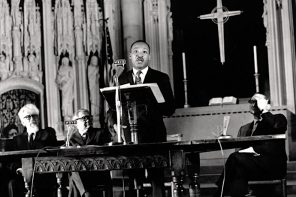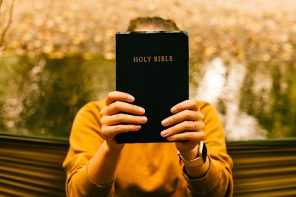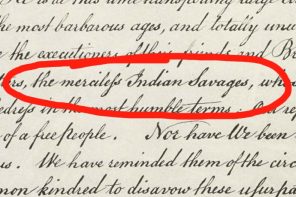More than 42 percent of the country’s homeless youth identify as LGBT, and approximately 90 percent of that group are of color. No matter how one feels about homosexuality, anyone in our community should be shocked and ashamed by these statistics: Think about it: 38 percent of our nation’s homeless youth are children from our community and our churches. After teaching them that the Black Church is their family, their home, our churches are failing our children and families in their time of need.
Recently, I had the opportunity to reflect on the strengths of the Civil Rights Movement that allowed so many of us to exercise our full freedom under the law. The success of that movement is tied so closely to the Black Church that it is nearly impossible to separate the political from the spiritual effort. This weekend as part of the National Equality March, I participated and preached at events in support of full civil equality for lesbian, gay, bisexual and transgender Americans. It was a wonderful to see that I numbered among several powerful African-American faith voices who gathered in the spirit of our civil rights leaders.
And still, it shocks me that the National Equality March did not have more support from the Black Church. After all, it was our church leadership that taught us to interpret the Bible in such a way that we did not see our slave roots as parallels to “tribes of Hamm” or ourselves as inherently inferior. So why do we now allow narrow views of select biblical passages to justify our prejudice against LGBT Americans?
Despite our own history, the pulpits of many Black churches continue to justify prejudice against our same-gender loving sisters and brothers using the Bible. At best, a pastor might preach about homosexuality by saying, “Love the sinner, hate the sin,” which mollifies some of those congregants with LGBT family or friends. But to our youth who know they are not heterosexual, such teachings cause great social and emotional harm. It may seem harmless or even protective to use such language, but it creates a climate that enables gay bashing and hate-based violence to grow and fester in our schools and communities. In many ways, these seemingly softer words are no different than those used by others who call on congregants to “exorcise the gay demons,” or to “evict Satan from their lives.”
Furthermore, this kind of behavior has only brought us tragedy. Our failure in the 1980s and 1990s to address the spread of HIV and AIDS with love, caring and understanding has led to what is now an epidemic in our community. It is not only men who have sex with men or who are on the down-low who are affected, but African-American women are the fastest growing group of people with AIDS – and too many of our children are either born HIV-infected or lose parents to this horrible disease. Religion-justified bigotry kept us from addressing this problem early on, and now the same type of prejudice is putting our LGBT children on the streets.
Just 40-odd years since the passage of the Civil Rights Act, another group of Americans, including African-American lesbians and gay men, seek full civil equality under the law and redress for the social and legal discrimination they face on a daily basis. The greatest obstacle to LGBT people obtaining basic civil rights continues to be restrictive and prejudicial interpretations of the Bible. The Black Church called out religious prejudice when it was used to justify slavery and racial discrimination. Today, we need to call it out again for our LGBT sisters and brothers – and especially our vulnerable LGBT sons and daughters.
I have faith, and I have deep faith in America. That is why I led the Sunday service before the National Equality March, participated in panels, and spoke to friends and allies in support of full civil and equal rights for LGBT Americans. I marched to support President Obama and our elected leaders, like John Lewis, Eleanor Holmes Norton, and others who fight to pass laws that extend civil and equal rights to all Americans. But most of all, I marched to protect our children from prejudicial interpretations of a loving Bible.
Before another one of our children is put on the streets because she or he is lesbian or gay, I ask the faithful in our community to reevaluate the harm we create by interpreting biblical passages with prejudice. We would not be here, today if our forebears did not make the same choice, and our children deserve the same show of strength and love.




